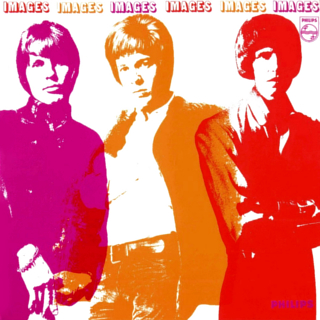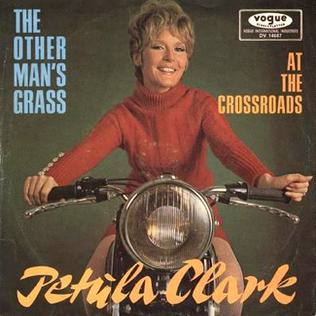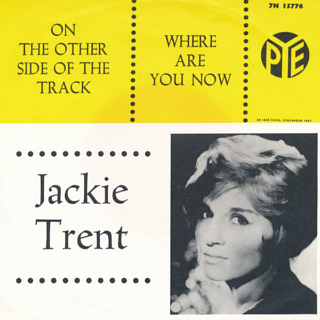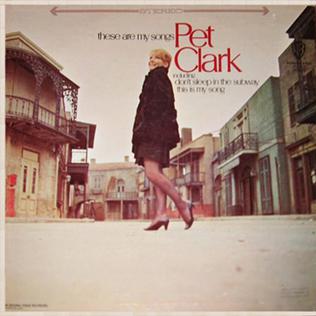
Yvonne Ann Gregory, better known by her stage name Jackie Trent, was an English singer-songwriter and actress. She was best known for co-writing several hits for Petula Clark in the 1960s and the theme tune to the Australian soap opera Neighbours in 1985.

Anthony Peter Hatch is an English composer for musical theatre and television. He is also a songwriter, pianist, arranger and producer.

The Walker Brothers were an American pop group formed in Los Angeles in 1964 by John Walker and Scott Walker, with Gary Walker joining shortly after. They adopted the 'Walker Brothers' name as a show business touch even though they were unrelated. After moving to Britain in 1965, they had several Top 10 albums and singles there, including the No. 1 hits "Make It Easy on Yourself" and "The Sun Ain't Gonna Shine (Anymore)", both of which also made the US Top 20 and Canadian Top 2. Between them was the UK No. 3 hit "My Ship is Coming In". They provided a unique counterpoint to the British Invasion, a period when the popularity of British bands such as The Beatles dominated the U.S. charts, by achieving much more success in the UK than in their home country.

5 Easy Pieces is a box set anthology of the career of Scott Walker. It was released in November 2003. The set comprises five themed CDs and a 56-page booklet.
"For Once in My Life" is a song written by Ron Miller and Orlando Murden for Motown Records' Stein & Van Stock publishing company, and first recorded in 1965.

"Who Am I" is a 1966 single by Petula Clark written by Tony Hatch & Jackie Trent and produced by Tony Hatch. By virtue of its title, "Who Am I" has long been the standard opening number for Clark's concerts. It also served as the centerpiece for the "Who Am I Medley", which opened Clark's 1968 U.S. television special.

"Colour My World" is a song written by Tony Hatch and Jackie Trent, and recorded by Petula Clark in 1966.

"Don't Sleep in the Subway" is a song written by Tony Hatch and Jackie Trent and recorded by the British singer Petula Clark, who released it as a single in April 1967.

Images is the third album by the American pop group The Walker Brothers. Released in 1967 the album reached number six on the UK Albums Chart. It was the last of their trio of 1960s albums. They would not record together again until 1975's No Regrets.

"The Other Man's Grass Is Always Greener" is a song written by Tony Hatch and Jackie Trent which was a 1967-68 hit for Petula Clark.

"Where Are You Now" is a 1965 song written by Tony Hatch and Jackie Trent. A ballad, it was commissioned for use in the Granada Television police drama It's Dark Outside. A recording by Trent, released in response to demand from viewers of the series, became her only top 30 hit when it reached the top of the UK Singles Chart for one week in May 1965. She was the first female artist in the United Kingdom to be a credited writer on her own number one single.

These Are My Songs is a 1967 album released by Petula Clark. In a break with longtime collaborator Tony Hatch, Clark joined forces with producer Sonny Burke and arranger/conductor Ernie Freeman for this release.

Petula is a 1968 Pye Records album release by Petula Clark leased to Warner Bros. in the USA.

"Pretty Girls Everywhere" is a song written by Eugene Church and Thomas Williams.

"My Ship Is Comin' In" is a song written by Joseph Brooks, which was first a song for the American soul singer Jimmy Radcliffe in 1965 and was later recorded and released by the American pop group The Walker Brothers as their fourth single that same year. Outside the US and Canada, the song's title was "My Ship Is Coming In". The accompaniment was directed by Ivor Raymonde. The song appeared as the opening track on the group's debut US studio album Introducing the Walker Brothers.

"(Baby) You Don't Have to Tell Me" is a song by New York songwriter Pete Antell and first recorded by singer Bobby Coleman. The obscure song was later recorded and released by the American pop group the Walker Brothers as their sixth single in 1966. The accompaniment was directed by Reg Guest.

"Another Tear Falls" is a song written by Burt Bacharach with lyrics by Hal David which was first a song for the American singer Gene McDaniels in 1962 for the British film It's Trad, Dad! as well as the flip side of his hit single "Chip Chip" and was later recorded and released by the American pop group The Walker Brothers as their seventh UK single in 1966. The accompaniment was directed by Reg Guest.

"Deadlier Than the Male" is a song written by American singer-songwriter Scott Walker under his real name of Scott Engel with UK record producer Johnny Franz. The song was first recorded and released by Walker's pop group The Walker Brothers as their eighth single in 1966. The accompaniment was directed by Reg Guest. The song was the title track for the 1967 British action film Deadlier Than the Male which featured the character of Bulldog Drummond.

"Lights of Cincinnati" is a song written by the English songwriters Tony Macaulay and Geoff Stephens which was first a song for the American singer-songwriter Scott Walker in 1969. The song was Walker's third solo single in the UK. The accompaniment was directed by Peter Knight.

"I Still See You" is a song written by Michel Legrand with lyrics by Hal Sharper which was first a song for the American singer-songwriter Scott Walker in 1971. The song was Walker's fourth solo single in the UK. The song was produced by John Franz with Bob Cornford credited as musical director. The song was the love theme for the 1970 British romantic drama film The Go-Between, directed by Joseph Losey.



















